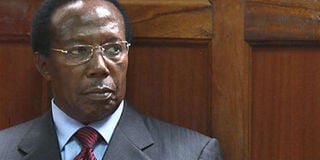How ex-Kenya Power boss Gichuru 'escaped' with millions

Former Kenya Power Managing Director Samuel Gichuru in court on July 11, 2011 during the hearing of his extradition case. PHOTO | FILE | NATION MEDIA GROUP
What you need to know:
- It is the Ewaso Nyiro power dam scandal that prompted the British government to start investigating Mr Gichuru and Mr Okemo.
- Part of the hidden loot was for a loan for a non-existent Ewaso Nyiro hydro-power plant which Kenyans will continue to repay until 2020.
The arrest of senior Kenya Power officials – and their subsequent arraignment - is the most spectacular in the history of the company that has been in the news of late for all the wrong reasons.
This happens when the office of the Attorney General (AG) is still sluggish on a corruption scandal involving a former Kenya Power Managing Director, Samuel Gichuru, who is wanted in Jersey to face money laundering charges together with former Cabinet minister Chris Okemo.
The two are said to have diverted more than Sh520 million proceeds of kickbacks to the tax-haven of Jersey.
KICKBACKS
They received the kickbacks from foreign companies which had been given tenders by Kenya Power, but a goof by former Attorney General Amos Wako and territorial battles between the Office of the AG and that of the public prosecutor over who was to extradite the two saw the court order the AG to re-start the process.
Part of the hidden loot was for a loan for a non-existent Ewaso Nyiro hydro-power plant which Kenyans will continue to repay until 2020.
Part of this loan was allegedly diverted to Mr Gichuru’s Jersey account as a bribe.
MONEY RETURNED
A Jersey court had laid down details of how Mr Gichuru and Mr Okemo hid the loot from phantom power projects, revealing an intricate web of foreign companies which openly paid bribes to Jersey accounts belonging to the two.
This was an indicator of how foreign companies, besides the local ones, were easily willing to pay bribes to access lucrative Kenya Power tenders and contracts.
Already, the Jersey government has seized Sh520 million loot and remitted it to Kenya after Mr Gichuru’s company, Windward Trading Company, admitted to have committed the offence.
It is the Ewaso Nyiro power dam scandal that prompted the British government to start investigating the duo after the matter was raised at the House of Commons in 2001.
LOAN
While three dams were to be built by 2007 at a cost of $350 million (Sh35 billion), the initial feasibility study, awarded to British firm, Knight Piésold, cost “five times what such services would normally cost”, according to a World Bank study team report published in 1992.
In order to facilitate the bribes to Mr Gichuru’s Jersey-registered Windward Trading Company, Kenya Power paid Knight Piésold Sh1.5 billion upfront even though the dam was not to be started in 10 years.
Finally, it was never built, leaving Kenyan taxpayers paying a loan for a non-existence project.
For the feasibility studies, Knight Piésold published 14 reports between 1991 and 1993 with each report costing an average of $2.7 million.
That means that the feasibility study alone cost Kenyans Sh3.8 billion.
SECRET BANK ACCOUNT
This project was supported by the British Export Credits Guarantee Department (ECGD), which backs UK companies to seek and win tenders abroad.
On June 21, 1990, ECGD supported a £68.1 million loan between ANZ Grindlays Bank and the Moi government - which was to assist in financing the contract between Kenya Power and Knight Piésold.
This money was later diverted to Jersey Islands where Gichuru had opened some secret accounts in 1986 with the help of Deloitte & Touche, a Jersey accounting firm.
It was after the British company came under pressure from the House of Commons that Knight Piésold officials turned against Gichuru and the power firm.
BRIBE
They said: “It was impossible to do work in Kenya without paying commission to important political figures. It was like a tax. One person we paid was Samuel (Gichuru),” Peter Garrat, an official with Knight Piésold in the Gichuru extradition papers, said.
Knight Piésold paid such commissions to various people.
Court records show that on different dates between 1986 and 2002 Windward received payments of $5.4 million (Sh540 million), £5.3 million, £4.4 million, $3.3 million, and 6.8 million Danish Kroners from various companies contracted by KPLC.




